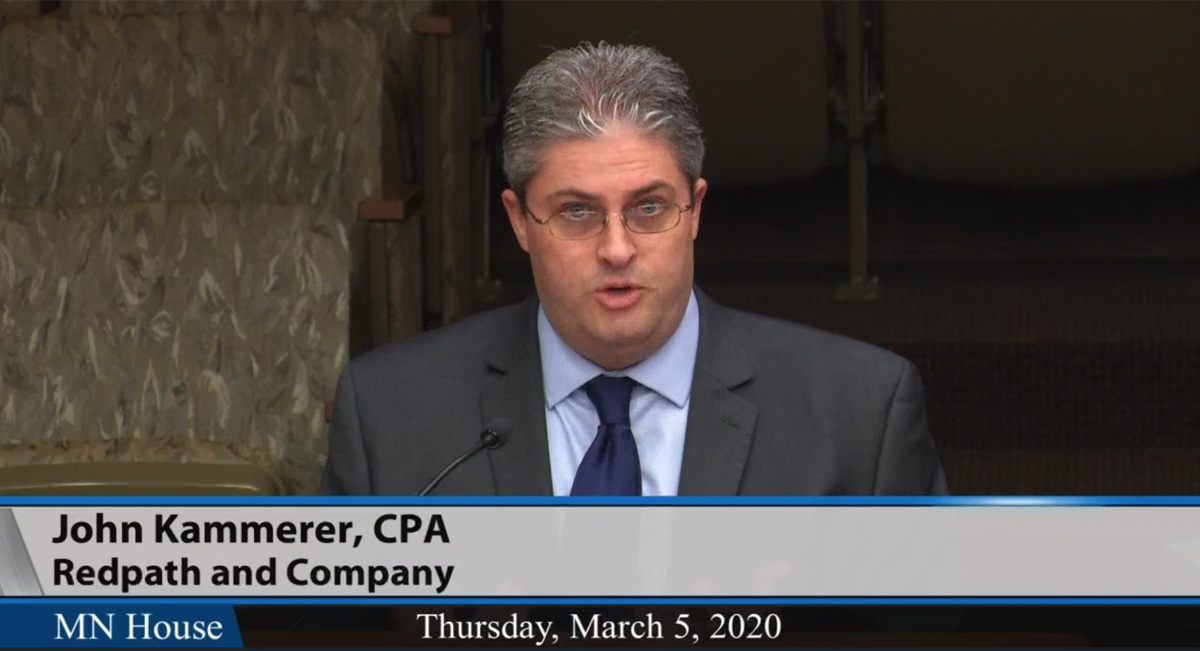Redpath Welcomes Mike Dunkle as a Transaction Advisory Services Partner
ST. PAUL, MN – February 3, 2026 – Redpath and Company is pleased to welcome Mike Dunkle as a Partner in the firm’s Transaction Advisory practice....

March 6, 2020 — Yesterday, on March 5th, 2020, business tax partner John Kammerer testified before the Minnesota House Tax Committee on behalf of S corporations and other pass-through businesses in the state of Minnesota. Testimony can be viewed by clicking here—his segment begins at four minutes and fifty-five seconds.
Like C corporations, S corporations and other pass-through businesses are subject to state and local taxes (SALT) on their business income. However, unlike C corporations where SALT is always paid at the entity level, only a few states tax pass-through entities directly—most states, including Minnesota, tax pass-through business profits at the owner level as part of their individual income tax return.
This distinction took on new significance because of federal tax reform. Under tax reform, businesses in states that tax pass-through income at the entity level can still deduct those taxes. In states like Minnesota, however, those taxes are subject to the new $10,000 cap on SALT deductions.
This new policy puts Minnesota at a disadvantage. The loss of SALT will cost Minnesota S corporations and partnerships $3 to $4 in tax for every $100 they earn. It's a big deal! There are over 96,000 S corporations residing in Minnesota and another 69,000 partnerships. That amounts to over 165,000 businesses that lost their SALT deduction beginning in 2018.
HF 871 would address this disparity—the bill would:
As an example of how this would work, take a contractor headquartered in Minnesota who also conducts business in Wisconsin. As a result of the Wisconsin legislation passed—which is similar to the Minnesota legislation—they were able to elect to pay tax on the Wisconsin-sourced income at the S corporation level in 2018. This meant a deduction that saved the owners about 2% on their taxable income in the state of Wisconsin. HF 871 would provide a similar benefit to this contractor if they completed a job in Minnesota rather than in Wisconsin.
If Minnesota successfully enacts this reform, it would not be alone. Connecticut, Wisconsin, Oklahoma, Louisiana, Rhode Island, and New Jersey have all enacted similar reforms over the past two years, while Alabama, Arkansas, and Maryland are all considering parity legislation this year.
The bill, as drafted, would succeed in restoring the full SALT deduction to electing businesses. There are, however, some unresolved items that would hopefully be addressed as the legislation moves through the legislature—including clarification of the treatment of distributions so that the owners could be sure to avoid double taxation. These are, by and large, small items that can be resolved by working together.
There isn't a valid reason for allowing C corporations to deduct their state and local taxes while blocking S corporations and partnerships from doing the same. These taxes are an obvious cost of doing business and should be treated as such.
HF 871 would address this unfairness, reduce the effective tax rates paid by Minnesota businesses, and make the state a more attractive place to do business, all while remaining revenue neutral to the state Treasury—meaning that it truly is a win-win.

ST. PAUL, MN – February 3, 2026 – Redpath and Company is pleased to welcome Mike Dunkle as a Partner in the firm’s Transaction Advisory practice....

The Redpath and Company BottomLine Newsletter ishere!

As 2025 drew to a close, the Governmental Accounting Standards Board (GASB) issued Statement No. 105, Subsequent Events. While the requirement to...